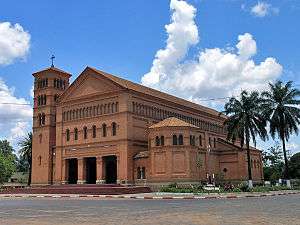Christianity in the Democratic Republic of the Congo
Christianity is the majority religion of the Democratic Republic of the Congo and is professed by a majority of the population. The number of Christians of all denominations in the Congo is estimated at over 63 million by the Pew Research Center, a figure representing approximately 95.7 percent of the national population or 2.9 percent of the world's Christians.[1] The largest denomination is Roman Catholicism which represents 50 percent of the national population, and is followed by Protestantism (20 percent) and Kimbanguism (10 percent) and other sects.[2] The history of Christianity in the area of the modern-day Congo is closely linked to the history of European colonial expansion.

History
.jpg)
The earliest evidence for the adoption of Christian religious practices in the area of the modern-day Democratic Republic of the Congo dates to the late 15th century. In 1491, King Nzinga of the Kongo Kingdom[lower-alpha 1] converted to Roman Catholicism, taking the Christian name João, after coming into contact with Portuguese colonial explorers. The conversion facilitated trade with the Portuguese and increased the status of the Kongo Kingdom in the eyes of European states. Afonso I (r. 1506–43) even travelled to Europe where he studied religion. The Kongo Kingdom adopted a form of Catholicism and was recognised by the Papacy, preserving the beliefs for nearly 200 years.[3]
The largest expansion of Christianity occurred under Belgian colonial rule. In 1885, Belgium's monarch, Leopold II, established a personal colony in Central Africa known as the Congo Free State which, in 1908, was annexed by Belgium as the Belgian Congo. Under both the Free State and Belgian regimes, Christian missions were encouraged to work in the Congo as part of the civilising mission which served as the colonial project's justification to European public opinion.[4] Missionaries played an important role in providing schooling during the colonial period.[4] Catholic mission, for example, helped to establish the Congo's first university, Lovanium, in 1954.[5]
In the post-independence period, distrust between the Churches and the state grew, exacerbated in the early 1970s by attempts by the new Zairean government to secularise education.[6] Since 2014, sporadic outbreaks of violence against Christians have occurred in North Kivu as part of the ongoing Kivu conflict. Massacres of approximately 645 people have been perpetrated by the Islamist Allied Democratic Forces rebel group which has been largely forced out of neighbouring Uganda.[7]
By denomination
| Christianity by country |
|---|
 |
|
|
|
|
Oceania
|
|
South America
|
|
|
Catholicism
For much of the colonial period, Catholic missions received preferential treatment and a subsidy from the state denied to missions from other denominations.[8]
In 2016, the CIA World Factbook estimated that 50 percent of the Congo's total population were Roman Catholic.[2] The Pew Research Centre provides the estimate of 47.3 percent or over 31 million people, or 2.8 percent of the world's Catholic population.[1]
Protestantism
The first Protestant mission in the Congo was sent by the British Baptist Missionary Society and arrived in 1878, shortly before the creation of the Congo Free State.[9] Throughout the colonial period, Protestant missions maintained a difficult relationship with the colonial authorities. Most Belgian officials were Catholics and distrusted Protestant missionaries, which were often foreigners from the United Kingdom or the United States, but were unable to expel them under the terms of the Berlin Conference.[10]
In 2016, it was estimated that 20 percent of the Congo's population were Protestant, excluding Kimbanguists.[2] The Pew Center provides a considerably higher estimate the number of Protestants (including Kimbanguists) at nearly 32 million or 48 percent of the population, representing 4 percent of the world's Protestants.[1]
Kimbanguism
Kimbanguism, officially the Church of Jesus Christ on Earth by His Special Envoy Simon Kimbangu, is a major Christian new religious movement indigenous to the Democratic Republic of the Congo. It holds that Simon Kimbangu (1887–1951) was a prophet but shares commonalities with Baptist Christianity. It is headquartered in Nkamba, Kongo Central which was Kimbangu's birthplace and is known as "New Jerusalem". It is estimated that as many as 10 percent of the Congo's population are followers.[2]
Others
The Pew Center estimates the Congo's population of "Other Christians" at 260,000.[1] Fewer than 0.1 percent of the population are Orthodox Christians.[1] Chrysostomos Papasarantopoulos was notably influential in spreading Orthodox Christianity in the Congo over 1970–1972.
See also
References
- The Kongo Kingdom was located on the Atlantic coast of Central Africa in parts of modern-day Democratic Republic of the Congo, Republic of the Congo, and Angola.
Citations
- "Global Christianity". Pew Research Centre. 1 December 2014. Retrieved 16 October 2016.
- "Congo, Democratic Republic of the (People and Society)". CIA World Fact Book. 2016. Retrieved 16 October 2016.
- Ross, Emma George. "African Christianity in Kongo". Heilbrunn Timeline of Art History (Metropolitan Museum of Art). Retrieved 16 October 2016.
- Boyle 1995, p. 453.
- Boyle 1995, p. 458.
- Boyle 1995, p. 467.
- "Villages 'obliterated' as Christian persecution grows in eastern Congo". The Catholic Herald. 19 Aug 2016. Retrieved 16 October 2016.
- Markowitz 1970, pp. 236-7.
- Markowitz 1970, p. 234.
- Markowitz 1970, pp. 234-6.
Bibliography
- Boyle, Patrick M. (1995). "School Wars: Church, State, and the Death of the Congo". Journal of Modern African Studies. 33 (3): 451–68. JSTOR 161485.CS1 maint: ref=harv (link)
- Markowitz, Marvin D. (1970). "The Missions and Political Development in the Congo". Africa: Journal of the International African Institute. 40 (3): 234–47. JSTOR 1158884.CS1 maint: ref=harv (link)
Further reading
- Markowitz, Marvin D. (1973). Cross and Sword: the political role of Christian missions in the Belgian Congo, 1908-1960. Stanford: Hoover Institution Press. ISBN 9780817911416.
External links
| Wikimedia Commons has media related to Christianity in the Democratic Republic of the Congo. |